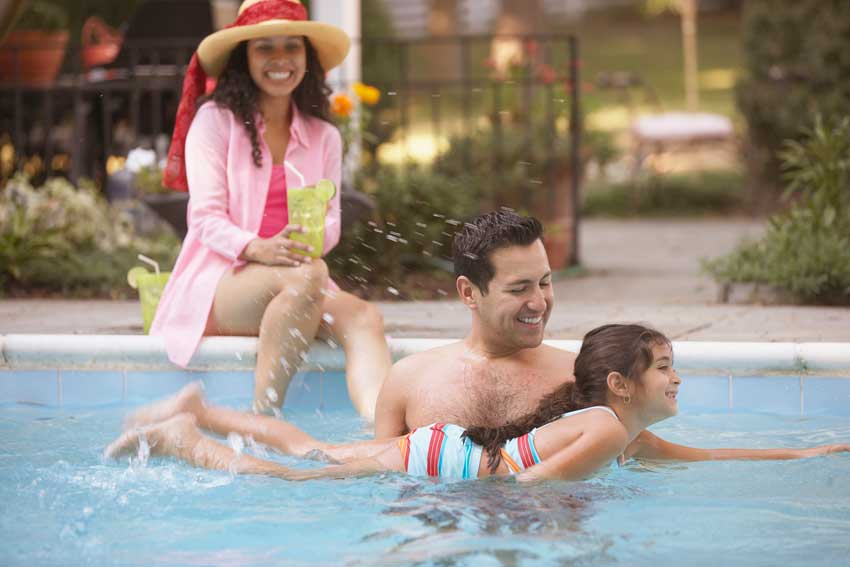Summer’s here — and so are warm weather safety concerns

(Ariel Skelley/DigitalVision via Getty Images)
School’s out and it’s time for summer fun and travel. But, when socializing this summer, be mindful of potential health and safety hazards. A few common-sense precautions may prevent a trip to the emergency room or save someone’s life.
In her emergency department work in Colorado, Dr. Comilla Sasson, American Heart Association vice president for emergency cardiovascular care science and innovation, and fellow doctors are seeing more cases that typically occur in summer, including heat illnesses, water accidents and fireworks mishaps.
Beat the heat
Plan outdoor activities for cooler parts of the day to prevent heat illnesses. Some, such as heat cramps and heat rash, are mild and can be treated by simply getting out of the sun and getting hydrated.
Heat exhaustion is characterized by profuse sweating, which is a natural cooling mechanism, and possibly nausea or a headache. The body temperature rises to around 100 degrees, Sasson said. If this happens, find a cool, shady spot as soon as possible.
Heat stroke is more serious. The body’s internal cooling system starts to fail, and the core body temperature may reach 104 to 108 degrees, Sasson said. Sweating stops, a person’s skin becomes hot and dry, their heart may beat fast, and they may lose consciousness. It’s important to call 911 to get emergency help right away. Heat stroke can lead to death.
Dehydration contributes to heat illness. So, drink plenty of water or other non-alcoholic fluids to stay hydrated.
Use sunscreen with SPF of 30 or greater and wear protective clothing and hats, even on cloudy days, to protect against sunburn. Severe sunburn can cause skin pain, swelling and blisters. Treat sunburn with pain relievers and by cooling the skin. Seek immediate medical care if you’re sunburned and have a fever over 103 degrees, confusion, dizziness or faintness.
Watch out on the water
Drowning is a leading killer of children. More children ages 1 to 4 die from drowning than any other cause of death. Many people overestimate their child’s ability to swim, so pay attention to your child’s swimming capabilities.
“That heightened awareness is really important,” said Sasson, who is also a clinical associate professor at the University of Colorado.
A child who can swim might still drown. That’s also true for teenagers and adults who get tired or have cramps while swimming. Keep children safe by ensuring fences are around pools and using U.S. Coast Guard-certified life vests when boating.
Make sure your child’s babysitter knows what to do in case of drowning, which can happen quickly and quietly. Close supervision is vital when children are swimming. Caregivers should avoid distractions and know CPR and how to get emergency help. Keep life preservers poolside, and if a child is missing, look for them in the pool or hot tub first.
Boating and rafting injuries and deaths also increase during the summer, so practice safety at lakes, rivers and oceans. Avoid getting out on the water if you’ve been drinking alcohol or are under the influence of drugs, Sasson said.
Perform CPR and save a life
If someone is unconscious or non-responsive, they may have suffered cardiac arrest, which means their heart stopped. Call 911 immediately and begin Hands-Only CPR. Even if you don’t have CPR training, you can still perform the procedure and possibly save a life, Sasson said.
Hands-Only CPR doesn’t require mouth-to-mouth breathing. Place your clasped hands in the center of the chest and press hard and fast, two inches down, about 100 to 120 beats per minute. One way to think about the pace is to use the rhythm of the Bee Gees’ song “Stayin’ Alive” or Lady Gaga’s song “Poker Face.”
Don’t hesitate or worry that it’s inappropriate or unnecessary. If the person suffered cardiac arrest, you’ll be helping the heart do its job until an ambulance arrives.
“You’re acting like an external heart,” Sasson said. “You can be buying somebody time.”
Every minute without CPR after cardiac arrest decreases a person’s chance of survival. By 10 minutes, death is likely. If an automated external defibrillator is available nearby, use the lifesaving device.
Wear a helmet, protect your brain
Injuries from crashes on bikes and scooters tend pick up in summer because of the increase in outdoor activities.
Wearing a helmet provides protection. As an ER doctor, Sasson said, she has seen “horrible, horrible traumatic brain injuries” resulting from bike and scooter wrecks.
Alcohol-related falls and accidents also increase during the warm weather party season, she said. Alcohol lowers inhibitions and can lead to bad decisions and increased engagement in risky behaviors.
A few simple precautions can help keep summer activities safe — and we can all enjoy this special season.





